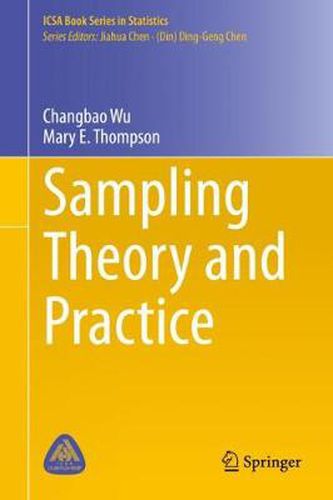Readings Newsletter
Become a Readings Member to make your shopping experience even easier.
Sign in or sign up for free!
You’re not far away from qualifying for FREE standard shipping within Australia
You’ve qualified for FREE standard shipping within Australia
The cart is loading…






This title is printed to order. This book may have been self-published. If so, we cannot guarantee the quality of the content. In the main most books will have gone through the editing process however some may not. We therefore suggest that you be aware of this before ordering this book. If in doubt check either the author or publisher’s details as we are unable to accept any returns unless they are faulty. Please contact us if you have any questions.
The three parts of this book on survey methodology combine an introduction to basic sampling theory, engaging presentation of topics that reflect current research trends, and informed discussion of the problems commonly encountered in survey practice. These related aspects of survey methodology rarely appear together under a single connected roof, making this book a unique combination of materials for teaching, research and practice in survey sampling. Basic knowledge of probability theory and statistical inference is assumed, but no prior exposure to survey sampling is required. The first part focuses on the design-based approach to finite population sampling. It contains a rigorous coverage of basic sampling designs, related estimation theory, model-based prediction approach, and model-assisted estimation methods. The second part stems from original research conducted by the authors as well as important methodological advances in the field during the past three decades. Topics include calibration weighting methods, regression analysis and survey weighted estimating equation (EE) theory, longitudinal surveys and generalized estimating equations (GEE) analysis, variance estimation and resampling techniques, empirical likelihood methods for complex surveys, handling missing data and non-response, and Bayesian inference for survey data. The third part provides guidance and tools on practical aspects of large-scale surveys, such as training and quality control, frame construction, choices of survey designs, strategies for reducing non-response, and weight calculation. These procedures are illustrated through real-world surveys. Several specialized topics are also discussed in detail, including household surveys, telephone and web surveys, natural resource inventory surveys, adaptive and network surveys, dual-frame and multiple frame surveys, and analysis of non-probability survey samples. This book is a self-contained introduction to survey sampling that provides a strong theoretical base with coverage of current research trends and pragmatic guidance and tools for conducting surveys.
$9.00 standard shipping within Australia
FREE standard shipping within Australia for orders over $100.00
Express & International shipping calculated at checkout
This title is printed to order. This book may have been self-published. If so, we cannot guarantee the quality of the content. In the main most books will have gone through the editing process however some may not. We therefore suggest that you be aware of this before ordering this book. If in doubt check either the author or publisher’s details as we are unable to accept any returns unless they are faulty. Please contact us if you have any questions.
The three parts of this book on survey methodology combine an introduction to basic sampling theory, engaging presentation of topics that reflect current research trends, and informed discussion of the problems commonly encountered in survey practice. These related aspects of survey methodology rarely appear together under a single connected roof, making this book a unique combination of materials for teaching, research and practice in survey sampling. Basic knowledge of probability theory and statistical inference is assumed, but no prior exposure to survey sampling is required. The first part focuses on the design-based approach to finite population sampling. It contains a rigorous coverage of basic sampling designs, related estimation theory, model-based prediction approach, and model-assisted estimation methods. The second part stems from original research conducted by the authors as well as important methodological advances in the field during the past three decades. Topics include calibration weighting methods, regression analysis and survey weighted estimating equation (EE) theory, longitudinal surveys and generalized estimating equations (GEE) analysis, variance estimation and resampling techniques, empirical likelihood methods for complex surveys, handling missing data and non-response, and Bayesian inference for survey data. The third part provides guidance and tools on practical aspects of large-scale surveys, such as training and quality control, frame construction, choices of survey designs, strategies for reducing non-response, and weight calculation. These procedures are illustrated through real-world surveys. Several specialized topics are also discussed in detail, including household surveys, telephone and web surveys, natural resource inventory surveys, adaptive and network surveys, dual-frame and multiple frame surveys, and analysis of non-probability survey samples. This book is a self-contained introduction to survey sampling that provides a strong theoretical base with coverage of current research trends and pragmatic guidance and tools for conducting surveys.